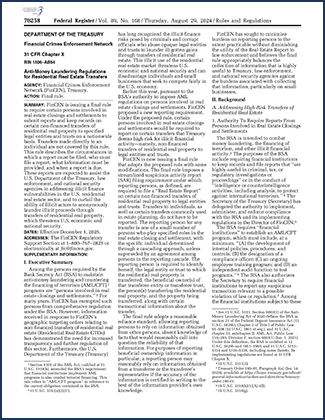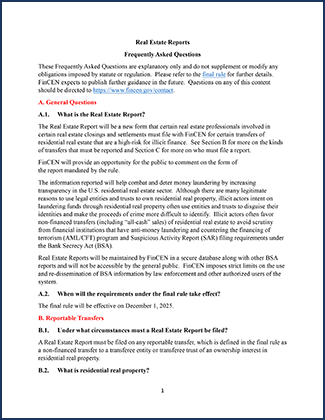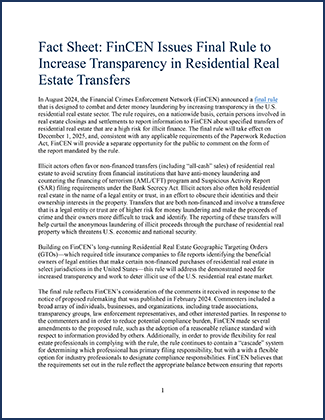Background
-
The deed transfer is for residential real estate, including vacant land intended for the construction of a 1-4 family structure;
-
Purchase is made with all cash or without institutional lender financing;
-
At least one of the buyers/transferees will be a legal entity, LLC, corporation, partnership, trust, trustee or other non-natural person;
-
If a transaction meets these requirements, details of the purchase, the buyer and the seller must be reported to the United States Department of Treasury's Financial Crimes Enforcement Network (FinCEN).
Resources
ALTA has developed resources, including buyer and seller forms, to assist industry professionals collect the information needed to comply with the rule. You must be logged in and either an ALTA member or a Policy Forms Licensee to access these collection forms. You may also access the collection forms if you have a FinCEN Resources subscription. Note that some FinCEN Resources are available exclusively to ALTA members.
Advisory and Background Documents
February 2016
The Hunt for Dark Money
FinCEN Education
What is a Transferee Entity or Trust
At least one buyer must be a legal entity or trust for the transaction to be reportable.
- Transferee entity - any person other than a transferee trust or an individual. This includes a corporation, partnership, limited liability company, incorporated association and estate. Certain regulated entities may be exempt.
- Transferee Trust - any legal arrangement created when a person places assets under the control of a trustee for the benefit of one or more persons or for a specified purpose, as well as any legal arrangement similar in structure or function to the above, whether formed under the laws of the United States or a foreign jurisdiction.
What Information Must Be Reported
For a reportable transaction, the reporting person (usually the settlement agent or attorney) must report:
- Property information. This includes the property's street address, legal description and date of closing.
- Reporting Person information. This includes the full legal name of the reporting person, the category they fall under in the reporting waterfall, and their street address.
- Buyer Information. This includes
- for Entities
- Legal name
- Current street address
- IRS tax ID number (TIN)
- EACH beneficial owner of the entity. A beneficial owner of a transferee entity is someone who (i) exercises substantial control over the entity (like an executive or managing member) or (ii) owns or controls at least 25% of the entity's ownership interest
- EACH Beneficial Owner's full legal name, date of birth, current residential street address, citizenship and IRS TIN (usually a social security number).
- for Trusts
- Legal name
- Date trust instrument was executed
- IRS tax ID number (TIN)
- Whether trust is revocable
- EACH beneficial owner of the trust. A beneficial owner of a trust is (i) the trustee, (ii) a beneficiary who has the right to demand a distribution of, or withdraw, substantially all of the assets of the trust, and (iii) a grantor or settlor who has the right to revoke the trust.
- EACH Beneficial Owner's full legal name, date of birth, current residential street address, citizenship and IRS TIN (usually a social security number).
- for Entities
- Seller information. This includes the seller's full legal name, date of birth, current residential street address and IRS TIN.
- Financial information. This includes the total consideration paid by the buyer and the dollar amount, method of payment, account number, originating bank and payor for each payment used to pay the consideration.
What Transactions are Exempt?
There are three types of exemptions: transactional, entity-based or trust-based.
Transactional Exemptions
- Death of an individual, including transfer pursuant to a will or trust
- Divorce or dissolution of a marriage or civil union
- Bankruptcy
- Court order or supervision
Entity Exemptions (including wholly owned subsidiaries of)
- Securities reporting issuer defined in 31 CFR 1010.380(c)(2)(i)
- Governmental authority defined in 31 CFR 1010.380(c)(2)(ii)
- Bank defined in 31 CFR 1010.380(c)(2)(iii)
- Credit union defined in 31 CFR 1010.380(c)(2)(iv)
- Depository institution holding company defined in 31 CFR 1010.380(c)(2)(v)
- Money service business defined in 31 CFR 1010.380(c)(2)(vi)
- Broker or dealer in securities defined in 31 CFR 1010.380(c)(2)(vii)
- Securities exchange or clearing agency defined in 31 CFR 1010.380(c)(2)(viii)
- Exchange Act registered entity defined in 31 CFR 1010.380(c)(2)(ix)
- Insurance company defined in 31 CFR 1010.380(c)(2)(xii)
- State-licensed insurance producer defined in 31 CFR 1010.380(c)(2)(xiii)
- Commodity Exchange Act registered entity defined in 31 CFR 1010.380(c)(2)(xiv)
- Public utility defined in 31 CFR 1010.380(c)(2)(xvi)
- Financial market utility defined in 31 CFR 1010.380(c)(2)(xvii)
- Investment company as defined 15 U.S.C. 80a-3(a)
Trust Exemptions
- A trust that is a securities reporting issuer defined in 31 CFR 1010.380(c)(2)(i)
- A trust in which the trustee is a securities reporting issuer defined in 31 CFR 1010.380(c)(2)(i)
- A statutory trust - defined as any trust created or authorized under the Uniform Statutory Trust Entity Act or as enacted by a State
- Estate planning trust where (1) the transfer is for no consideration and (2) the transferor/seller (and/or their spouse) is also the settlor or grantor of the trust







